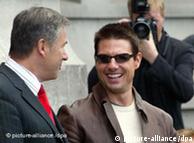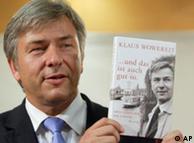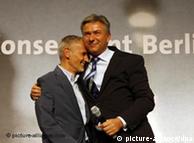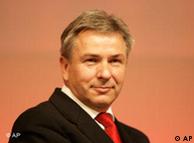Berlin | 16.06.2011
Ten years in office, Berlin's mayor still standing strong
When journalists report on the politician Klaus Wowereit, the headlines often sound apolitical. That may have something to do with the fact many of them never believed he would make it, and they are amazed even now by his success. Many an analysis of Wowereit's secret to success ends in helpless surrender. A prime example is a May 2005 headline from the newspaper Die Zeit: "The international press is filled with enthusiasm for Berlin Mayor Klaus Wowereit. The only question is: why?"
This could be because the view from outside was and is entirely different from the view from within. When Time magazine puts Wowereit on its cover, it shows that the man's charisma is capable of successfully selling the Berlin brand on a global scale. The city is, in the eyes of many, "poor but sexy." That quote, of course, comes from Wowereit himself.
Spoken like an adman
 Wowereit has been a master of showing off his city's coolness
Wowereit has been a master of showing off his city's coolness
No professional in advertising could have better formulated the unique mix which makes up Berlin: it has a rich history, cheap rent, lavish art studios. The allure of the unfinished and temporary brings in people from all over the world. And even if the vast majority of the 3.4 million Berliners profit little from this, they have come to terms with it.
"Wowi," as he is affectionately known, takes care of the day-to-day running of a city with hundreds of thousands of unemployed and welfare recipients. Or at least that's how he wants it to look. The 57-year-old says he wants people to come to him with their worries and problems: "I don't want to have the kind of persona where people see me and say, 'Oh, here comes the mayor - quick, let's get out of his way!'"
Wowereit's official title is "Ruling Bürgermeister," but, when he came to office, the tabloid press christened him the "Ruling party-meister," because he seemed never to miss a celebrity event. But they seem less worried about that nowadays, perhaps because Wowereit has succeeded at playfully turning the accusations into something positive. In his autobiography, published in 2007, the politician says he learned quickly that parties were "socially relevant appointments." He stands by that to this day.
"... and that's good the way it is!"
But there's more to Wowereit's life than politics: his 300-page autobiography, "...und das ist auch gut so" ("... and that's good the way it is"), keeps it very much on the sidelines.
 The mayor published his autobiography in 2007
The mayor published his autobiography in 2007
The title comes from his public coming-out statement at a special meeting of his Social Democratic Party just days before his election on June 16, 2001: "I'm gay, and that's good the way it is." His words have since become a cherished motto of the gay rights movement in Germany.
Perhaps even bolder and more provocative than his outing was his controversial decision to form a coalition with the successor to the East German communists, the Party of Democratic Socialism (later the Left party), in 2002. When he won reelection four years later, he made the same decision. And he did it with the self-confidence of a man celebrated in the international press as both a "smart big city boss" and a "glamour guy."
Politician with entertainment value
Wowereit's counterpart in Barcelona, Joan Clos, says he would gladly have a position like that of the Berliner. He said in 2005 that he envied Wowereit for his political power in being both the premier of the city-state of Berlin and its mayor at the same time.
Thomas Staubhaar, director of the Hamburg Institute of International Economics, calls Wowereit the "personified store sign" of Berlin in the competition between big cities. In numbers, he does quite well: 120,000 new jobs brought to Berlin between 2005 and 2009, many of them in creative fields like film, media and science. The city also has won enthusiastic praise for its hosting of mega-events like the 2009 Athletics World Championships and, of course, the 2006 Football World Cup.
 Seen here with his partner Jörn Kubicki, Wowereit has become an icon of the gay rights movement
Seen here with his partner Jörn Kubicki, Wowereit has become an icon of the gay rights movement
"One is allowed to be proud of oneself"
Wowereit enjoys his esteem. "One is allowed to be proud of oneself," he once said. In September, he hopes to be elected mayor for a fourth time. If he manages to jump that hurdle, his next great test will come in June 2012, when Berlin's grand new airport is scheduled to open its runways. It's a major investment in the booming metropolis, and it's not just Wowereit who hopes it will bring significant returns for the city.
The mayor describes the multi-billion-euro project in his own trademark blend of understatement and confidence. "We're not building a marble palace, but we're also not building a tin shack," he said of the airport. Rather, it's to be a sensible, functional airport which will also boast good architecture. Wowereit prophesied that the airport would become a kind of international business card for the city, as the new central train station has already done.
"Typical Berlin bigmouth," grumble those who were always suspicious of capital city hype. For Klaus Wowereit, those kinds of people are the real grouches. Because naturally the residents of the city he governs are much friendlier than their reputation, he told the magazine Geo Spezial: "We Berliners win people over with our charm and natural wit." Who'd have thought it?
Author: Marcel Fürstenau / acb
Editor: Michael Lawton

沒有留言:
張貼留言